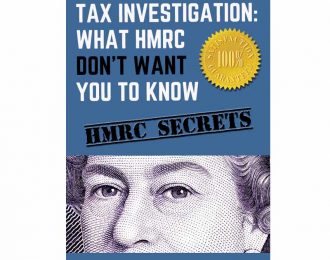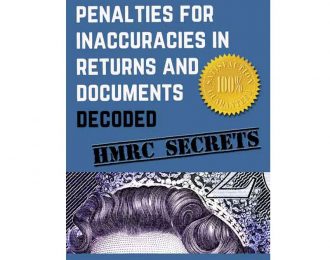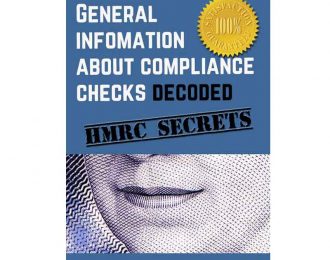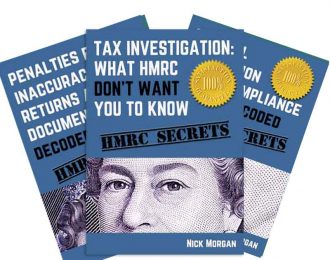HMRC SECRETS
One in four of us who phones up HMRC for advice gets the wrong information. Oh and did you know that you can see the files HMRC hold on you? No wonder they don’t want to give out their email addresses!

1. IT’S NOT EASY
The official line of HMRC is that Self Assessment is easy. This is not true. Not only is tax extremely complicated but the laws change every year. The truth is that tax is taxing, even if your return is small there are still vast areas of grey to get swallowed up in.

2. THE INFORMATION HMRC GIVE OUT IS OFTEN INCORRECT AND INCOMPLETE
A Civil Service Capability Review admitted one in four of us contacting HMRC for advice is given, incomplete or inaccurate information. One in four! That’s a phenomenal figure for failure! The system is so complicated they can’t even get it right themselves.

3. YOU CAN LOWER THE CHANCES OF BEING CAUGHT
Only a very small percentage of investigations are random, so if you are picked the chances are that you’ve done something to attract the attention of HMRC. This may be that your income is dramatically up and down or that returns are always late, or that you are claiming excessively high expenses in proportion with your income – all these things can make you high risk in the eyes of HMRC.

4. THE BURDEN OF PROOF IS ON YOU
You are guilty unless you can prove otherwise. Here’s an example, four years ago your mother gave you a cheque for £50 on your birthday and you put that into your personal account. HMRC will want to search out that account and ask you to prove where that cheque came from – they will most likely want to see a statement from your mother’s bank account confirming the cash was a gift. If you can’t do this HMRC will call this undeclared income; you will be taxed on it and you will also have to pay interest and penalties too.

5. YOU GET THE EXPENSES THEY ALLOW / YOU NEGOTIATE
Stephen Camm, head of tax investigations at PwC says, Tax investigations are like sport, you need to know the rules: if you play Lacrosse without knowing the basics you are going to get hurt.
On AccountingWeb accountant Louise gives an interesting story to illustrate this, “My friend and her husband were running a cleaning business, and had a van for work, and a car for private use, so they didn’t use the van for private purposes as it was always full of cleaning materials, buckets, ladders etc.”
“An inspector had claimed that deductions for motoring were too high, and that a proportion of the expenses for their van should have been disallowed as private.
“Despite having always employed a qualified accountant, he advised them to just agree to the inspectors demands… as it would be easier all round, and she was unwell at the time so didn’t need the added hassle of taking on her accountant as well as the tax man.
“Unfortunately, by the time the inspector had scaled back 6 years, added penalties, interest and the like, they had to re-mortgage their home to pay the final demand. All because they received poor advice – after all, if the van really was 100% business use, which she is adamant that it was, they should have stuck to their guns.”

6. YOU CAN READ THEIR MANUALS
HMRC publish the manuals issued to investigating officers. The Enquiry Manual is here and a full list of other manuals is here. These really are manuals and they can be a very dull (and technical) read but some contain fabulous pieces of information and it’s well worth persevering.
This is interesting, EM2001 – Working an Enquiry: Reviewing Earlier Years: Introduction states, “It is not effective use of your time to be pursuing cases involving small amounts into earlier years. If the person has no assets and has ceased trading with no prospect of income, there is no point in creating a debt which can never be paid. ” I bet that there are quite a few investigators who have forgotten that line!

7. YOU CAN SEE THE FILES HMRC HOLD ON YOU
Under the 1998 Data Protection Act you have the right to see papers in your file. This may include HMRC reviews and notes of telephone calls and emails which will give you an idea of how strong HMRC think their case is and how long they think the investigation will continue. More detail on the HMRC website here. Some requests are more fruitful than others. HMRC says, “The law allows us to withhold information, for example, where release would be likely to prejudice the assessment or collection of any tax or duty.” You can also use the Freedom of Information Act to find out how HMRC operates, for more information click here.

8. THE SETTLEMENT FIGURE MAY NOT BE WHAT IT APPEARS TO BE
After years of negotiation HMRC will present you with a settlement figure. The impulse for the tax payer will be to sign and bring the ordeal to an end. This figure – unfortunately – is not what it appears to be, it’s the tip of an iceberg: if you agree to it you will find yourself slipping into some very icy water. HMRC will take (or “scale”) that figure back (making the assumption that what you have done in one year you have done in others) they will then add penalties and interest. In short you will end up being given a final bill which is much bigger than you anticipated.

9. YOU CAN EMAIL THE HMRC BOSSES
HMRC don’t like using email and don’t publish individual email address on their headed paper, indeed finding out their first names can be a tricky business! Once you know the full name of the individual it’s straightforward to work out the email address: its normally firstname.secondname@hmrc.gsi.gov.uk so Permanent Secretary for Tax Jon Thompson can be mailed as Jon.Thompson@hmrc.gsi.gov.uk. You can get the bosses’ names here.

10. THEY ARE NOT HAPPY
Year after year the biannual Employee Engagement Survey shows how downtrodden and bulled the HMRC rank and file feel, 75 per cent of staff would NOT recommend HMRC as a place to work and the same number failed to respond positivity to the statement, HMRC inspires me to do the best in my job.

11. HMRC have Double standards – and then some
It’s one rule for you and another for them. When you are investigated HMRC want to see every single taxi receipt, train and bus ticket claimed as an expense.
However in the unlikely event that a celebrity, a Royal, an MP or a HMRC employee is the subject of an investigation HMRC does not require the same vigorous level of documentation. Indeed in many cases HMRC will simply take the word of the individual that what they say is correct. The Telegraph reports, “Each MP claims an average of £135,850 a year in expenses – a total of £87.6 million. They only have to produce receipts for items of more than £250.”
As for HMRC themselves, well Clive Gawthorpe, a UHY Hacker Young partner, says: “Accountants who frequently face challenges over expenses for as little as £10 will find it ironic that HMRC runs such a liberal ‘no questions asked’ system for its own employees.”







